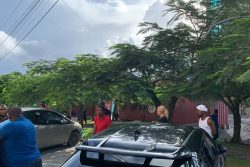Dear Editor,
It is no secret that the WPA as a party and its leadership – the executive committee ‒ have been subjected to public and on occasions, very hostile criticism, for what our detractors have interpreted as our silence in relation to the coalition government’s action and/or inaction on important matters affecting Guyana and its citizens. These criticisms have also been directed at the executive from members of the party and supporters, both at home and abroad.
The recent action by President David Granger to remove WPA Co-Leader, Dr Rupert Roopnaraine, from the Ministry of Education without consulting the party, and the announcement of his decision during the party’s annual June 13th commemoration of the assassination of Comrade Walter Rodney have only served to add fuel to the fire. The President’s actions, whether deliberate or not, have objectively shifted the balance of forces in the WPA and weakened the present leadership. The consequence of this development for the APNU, the wider coalition and the country, is at this time, difficult to predict.
What is undoubtedly true at this juncture in the party’s life is that its present leadership, which I am part of, is on trial both in and out of the party. I believe that it is pointless for us in the leadership to engage in the blame game. We must accept that it is our own inaction, tactical or whatever, that has led to this state of affairs in the party. In confronting this issue we must bite the bullet and do what we have always done in the past. Our forte over the years resides in our ability to indulge in criticism and self-criticism and then move forward. This we have done both privately and publicly and will forever be an important part of our political culture. Now is no different.
Over the two years of the life of the APNU+AFC government we, in the WPA, have acted with caution in relation to matters of the coalition and government in the interest of the nation. In doing so we are accused of betrayal of the party’s historic principles, and its commitment to the working people, the poor and powerless in the society, and the Rodney legacy. While I do not agree with that interpretation of our politics these serious accusations cannot be ignored.
Politically, we in the WPA are now in a situation where if we don’t assert our right to independent thought and action, we will in (2020) face the damning accusation of bringing nothing to the fortunes of the APNU+AFC coalition.
We have to be mindful that in the present construct of the APNU, there is no objective way to determine the electoral or political strength of the smaller parties in the alliance. These parties are at a disadvantage since there is no way to determining what votes they bring to the collective. Small parties are regulated to our last known election performance. Added to this difficulty, we operate in a political culture which shows little value for ‘ideas’. In this cultural paradigm, politics is simply about votes and big money. These are erroneously seen as the only tools for victory in elections.
Given this reality the WPA has to return to activism in the communities like it used to do in the early days, and become a visible political force on the ground, acting in its own name. This in no way means abandoning our commitment to the APNU and the APNU+AFC coalition. The engagements between the parties which were involved in the discussions that led to the formation of the APNU recognized the right of parties to independent lines of action even as they remain members of the APNU. In my view there is no other way out for the party at this point in its history. We also have to be cognizant of the fact that the backward political culture prevailing in the society and the logic inherent in this culture are unlikely to change in the near future.
In concluding, it is my contention that the need for the WPA to reassert itself in the political life of the country is becoming more urgent and should, for its own survival, and for the success of the APNU+AFC coalition in the 2020 general and regional elections, be given a high priority. In exercising its right to independent thought and actions, it will change the public’s perception of the party and its leadership. More so it would be addressing the often asked question, Is the WPA dead?
Yours faithfully,
Tacuma Ogunseye








